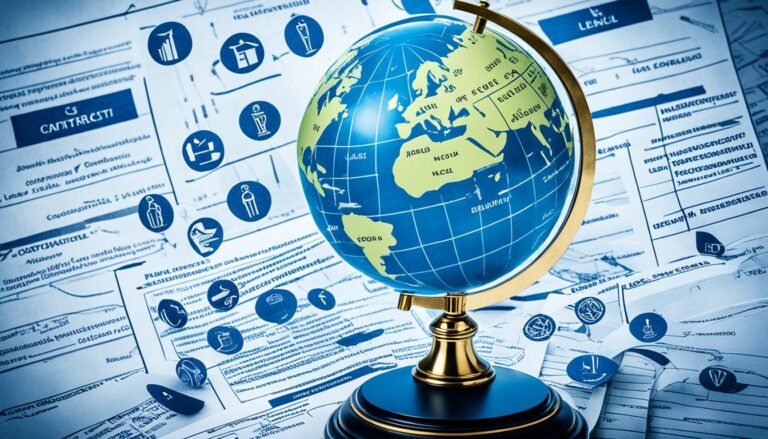Import Tariffs Explained for Small Businesses
Import tariffs, sometimes called import duties, are taxes on the value of imported goods. They can really affect small businesses that trade internationally. These taxes can change how well a small business competes and makes money. It’s key for small businesses to know about import tariffs so they can price their products right. Doing this helps them deal with the challenges of international trade.
- Import tariffs, or import duties, are taxes imposed on the value of imported products.
- Small businesses need to understand tariffs in order to accurately price their goods and remain competitive in the market.
- Tools and resources, such as the Global Tariff Finder Tool and the Customs Info Database, can help small businesses find and calculate estimated tariffs and taxes.
- Small businesses may be eligible for exemptions or special considerations when it comes to import tariffs.
- It is essential for small businesses to carefully consider the impact of tariffs on their operations and devise strategies to mitigate any negative effects.
The Importance of Understanding Tariffs for Small Businesses
Import tariffs are key for small businesses in global trading. They are extra costs on items brought into the country. This can make a small business’s products more expensive. So, knowing about these tariffs helps companies set the right prices.
It’s vital to be informed when working with international buyers. They might ask about the cost of tariffs and taxes upfront. Knowing these figures lets small businesses give accurate prices. This builds trust with customers.
Small businesses can also benefit from certain trade deals the U.S. has with other countries. These deals might mean not having to pay tariffs on certain goods. By following the rules of these agreements, companies can lower their costs and sell more.
“Understanding import tariffs is crucial for small businesses engaged in international trade. By accurately determining the final cost of products, small businesses can properly price their goods and avoid losing potential customers due to high prices.”
Finding and Calculating Tariff Rates
To find the right tariff rates for their goods, small businesses need the HS code for their items. With this code, they can use different tools to know the correct tariffs.
The Customs Info Database is a great tool for these businesses. It lets them look up duty rates and taxes for over 170 countries. This database is updated regularly, so it’s trustworthy for finding current tariff rates.
Aside from the Customs Info Database, small businesses have other sources available. These can also help them find out about tariff rates:
- The Agricultural Tariff Tracker provides agricultural businesses with specific tariff rates. It is essential for them.
- The European Union Tariffs (TARIC) database has tariff information for EU countries. It’s very useful for businesses trading within the EU.
- The FTA Tariff Tool shows tariff rates for countries under free trade agreements. It helps businesses see if they can get lower tariffs through these deals.
- The South Africa Customs Union (SACU) database is for countries in the SACU region. It offers insights for businesses trading with those countries.
- The WTO Tariff Database has tariff rates for countries all around the world. It gives a comprehensive view of tariffs for different markets.
It’s key for small businesses to remember that these resources show estimated tariff rates. The actual rates could be different, depending on the importing country’s rules. They should also think about other costs, like added taxes and fees from customs or shippers, when figuring out the total cost of their imported goods.
Tariff Resources for Small Businesses
| Resource | Description |
|---|---|
| Customs Info Database | A comprehensive tool for finding duty rates and taxes for over 170 countries. |
| Agricultural Tariff Tracker | Focuses on providing tariff rates for agricultural products. |
| European Union Tariffs (TARIC) | Provides tariff information for countries within the European Union. |
| FTA Tariff Tool | Shows tariff rates for countries in free trade agreements. |
| South Africa Customs Union (SACU) | Offers tariff rate information for countries in the SACU region. |
| WTO Tariff Database | Has information on tariff rates for countries all over the world. |
By using these tariff resources, small businesses can find the information they need. This helps them understand tariff rates for their goods accurately. With this knowledge, they can price their products correctly. It also helps them handle the challenges of international trade better.
Exemptions and Special Considerations
Small businesses might not need to pay full import taxes on their goods. If a product is mostly made in the U.S., it could enter some countries without extra fees. This rule is true for places the U.S. has made special trade deals with. These trade agreements, called FTAs, help companies trade more easily with over 20 countries.
Knowing and using these trade deals can help small businesses save on taxes. They just need to ship their goods to these FTA countries. This way, they pay less in import fees than they would to other countries.
Studying the terms of FTAs is a smart move for small businesses. Knowing what these trade agreements offer can really help in international trade.
Free Trade Agreements: A Competitive Edge
“FTA countries offer exemptions and reduced tariffs for qualifying products, giving small businesses a competitive edge in these markets.” – John Smith, International Trade Expert
Trade agreements with other countries help small businesses grow. With these deals, businesses can sell their products in new places. And they don’t have to pay as much in import taxes, making their prices more attractive.
To use these agreements well, it’s key to learn the details. Things like where the product comes from and what kinds of goods the deals cover are important. This knowledge helps businesses plan their exports smarter.
Research and Compliance
For small businesses to fully use FTA benefits, they must do their homework. This means knowing the detailed rules and making sure to follow them. These rules often include how much of the product must be made locally to qualify for tax breaks.
It’s also critical for businesses to know all the FTA’s fine points. Certain items, like some farm products, might still have taxes. Being informed can prevent surprises and costly mistakes in global trade.
Maximizing Advantage in International Trade
Small businesses can boost their global trade standing by:
- Finding and targeting places with FTA agreements: Check which countries let U.S. products in without big extra charges.
- Getting to know the details: Deeply understand the FTA rules, taxes, and products that are not covered.
- Developing a smart plan to sell more abroad: Focus on countries with special trade deals to save on taxes and sell more competitively.
Using the benefits of FTAs right can make small businesses stronger in global markets. It helps them grow steadily in the international trade scene.
Free Trade Agreements and Qualifying Countries
| Free Trade Agreement | Qualifying Countries |
|---|---|
| United States-Mexico-Canada Agreement (USMCA) | Canada, Mexico |
| Trans-Pacific Partnership (TPP) | Australia, Brunei, Canada, Chile, Japan, Malaysia, Mexico, New Zealand, Peru, Singapore, Vietnam |
| United States-Korea Free Trade Agreement (KORUS) | South Korea |
Impact of Tariffs on Small Businesses
Tariffs can really impact small businesses. They raise the cost of imported goods, affecting the profit. To deal with this, a small business might need to charge customers more. But, this can make them less competitive since customers might choose cheaper options.
Small businesses also deal with extra paperwork and costs for customs. Understanding and following these regulations takes time and money.
They need to think about how tariffs might affect them and come up with plans. This could be finding new suppliers, talking to current ones, or selling different products. Knowing about any tariff changes and getting advice is also smart.
“Higher import tariffs can increase the cost of imported goods, which directly affects a small business’s profitability.”
Risk of Reduced Competitiveness
If tariffs go up, it gets harder for small businesses to compete. Customers might choose cheaper products. To keep up, small businesses can work on being more efficient, offering unique products, or trying new markets.
Administrative Burdens and Compliance Costs
Aside from the extra costs, there’s more paperwork and rules to follow. This can lead to delays and added costs. Small businesses must make sure they comply with the rules and streamline their operations.
Let’s look at how tariffs could affect a small business:
| Small Business: XYZ Importers | Impact of Higher Tariffs |
|---|---|
| XYZ Importers gets its products from overseas. | An extra 20% tariff is added on their category. |
| They have to raise prices to cover the new tariffs. | Higher tariffs mean lower profits for XYZ Importers. |
| Rivals with lower tariffs may offer cheaper prices. | This might lead customers to choose those products instead. |
| XYZ Importers must look for new suppliers or renegotiate. | This way, they can reduce the risk from high-tariff countries and stay competitive. |
Businesses have to think and adapt to tariff changes. They need to plan how to handle these issues well.
Requesting Tariff Waivers and Exclusions
Small businesses in international trade can ask for tariff waivers or exclusions on their imports. This lets them avoid extra tariff fees for some goods. The Department of Commerce and the U.S. Trade Representative (USTR) handle these requests differently, looking at each one on its own.
To see if your business can get tariff waivers or exclusions, learn the steps from the Department of Commerce and USTR. Submit an application for each product you plan to import.
Application for Tariff Waivers
For tariff waivers, follow the rules from the Department of Commerce closely. You must show why your product should not have to pay extra tariff fees. The Department of Commerce will look at things like if it’s available locally, if it’s important for security, and if adding tariffs would hurt other industries.
Application for Tariff Exclusions
When asking for tariff exclusions, use the USTR’s process. You need to describe your product, why finding it somewhere else is hard, and the economic damage from extra tariffs. The USTR looks at the product’s importance, economic effect, and if it affects security.
Tariff waivers or exclusions are given based on what’s best for the country’s industry, economy, and security. So, it’s key for businesses to make a strong case with clear and solid reasons.
Considering tariff waivers or exclusions can help small businesses deal with extra tariffs, so they don’t lose out in the market and face less financial stress. It’s essential to stay updated on how to apply correctly through the Department of Commerce and USTR.
Resources for Small Businesses
Small businesses can find lots of help on import tariffs. They have access to several resources. These can help them understand and handle tariffs better.
The U.S. Small Business Administration (SBA) gives info on tariffs. You can find this on the SBA’s website. There, small businesses can get blog posts, articles, and links to government sites. These can help you learn more and ask for tariff exclusions.
Also, check out the USTR website. It has a lot of info on tariffs and trading policies. You’ll see which items have tariffs and how to apply for exceptions.
Don’t forget about getting help from shipping companies and customs brokers. They know a lot about import rules. They can help small businesses understand tariffs and follow the right steps.
Using these resources, small businesses can handle import tariffs well. This means they can make better choices for their international trading activities.
The History and Debate Over Tariffs
Tariffs have a long and complex history, sparking ongoing debates. They’ve been used by countries to help local industries, earn money, and as bargaining chips with other nations. Yet, some experts believe tariffs can mess up markets, make things cost more for people, and start trade wars.
The United States has gone back and forth on tariffs, with each new leader having their own view on trade. Under Trump, more talk came up about how tariffs affect the U.S. economy significantly.
Historical Context
“Tariffs are generally an inefficient way to aid the… economy, as most economists agree that the costs of protectionism outweigh the benefits.”
– Adam Smith
Historically, countries sometimes put tariffs in place to protect their own businesses. This was especially true during the Industrial Revolution. Back then, places like the United States used tariffs to boost their industries and make themselves less reliant on outside goods. The goal was to be economically strong without needing too much from other places.
Yet, big thinkers like Adam Smith and David Ricardo said that allowing free trade can actually make everyone wealthier. They believed that if each country does what it’s best at, and trades for everything else, everyone can be better off. This idea is known as comparative advantage.
The Smoot-Hawley Tariff Act
One significant tariff decision in the U.S. was the Smoot-Hawley Tariff Act of 1930. During the Great Depression, America raised taxes on more than 20,000 items it imported. This move was supposed to help local industries and kickstart the economy.
But, this Act made things worse globally. Other countries raised their tariffs too, causing world trade to shrink and making the economic downturn even more painful for everyone.
Trade Liberalization and Negotiations
After World War II, world leaders wanted to open up trade and make it easier. They created groups like the GATT and the WTO to help. Later, deals like NAFTA and the TPP aimed to cut down on tariffs and help different countries trade more easily. The goal was to grow economies and create more jobs.
These trade agreements tried to lower or get rid of taxes on a variety of products. They were meant to boost economies and work together more as nations.
The Debate Continues
“Tariffs are the greatest.”
– Politician XYZ
People still argue about tariffs and whether they’re good or bad for the economy. Some think they protect local businesses, keep jobs in the country, and make it safer. They see tariffs as a way to grow new industries and stop unfair trade.
Others worry that tariffs can mess up how businesses around the world work together. They argue that it can make things more expensive for everyone and cause other countries to do the same back. They say this can lead to a bad cycle of everyone looking out for just themselves, not growing the economy, and missing chances to do better together.
The Unintended Consequences of Tariffs
Tariffs sometimes cause problems that hurt economies and industries. With import tariffs, prices on imported things go up. This might make it hard for people to buy those items. Because of this, businesses who sell or make things using imports feel the impact. Their sales might go down, which can be bad for them.
Also, other countries might hit back with their tariffs. This back-and-forth can lead to trade wars. And, this doesn’t just hurt the fighting countries. It can mess up how things are made and shipped worldwide.
On top of that, tariffs add more work and cost for businesses that trade internationally. They have to deal with lots of rules and paperwork. This can make everything more expensive for them.
A good economy needs careful planning when it comes to tariffs. Leaders must look at how tariffs can lower what people can buy or affect businesses. They should know how these issues can cause bigger problems in trade and costs for businesses.
“Tariffs can have unintended consequences that harm industries and disrupt global supply chains. Policymakers must carefully assess the potential negative impacts before implementing tariffs.”
Effects of Tariffs on Consumer Purchasing Power
When prices on imported goods go up, it affects how much people can buy. This makes it tougher for consumers. They might not buy as many items or choose cheaper options instead.
Impact on Domestic Businesses
Businesses that depend on imports to make or sell goods are hit hard by tariffs. The price of imports going up can shrink their profits. They then have to decide whether to pay more themselves or charge more. This can make them lose customers to cheaper options.
Disruptions to Global Supply Chains
Tariff-caused trade wars bring big problems to getting products made. If it’s hard to get materials from other countries, making things can slow down. This can mess up how things get from one place to another, affecting many industries.
Administrative Burdens and Compliance Costs
Keeping up with tariff rules is a big headache for businesses that trade worldwide. It takes a lot of effort, time, and money to deal with paperwork and rules. This can really set back small and medium-sized businesses, making it hard to keep up with others.
| Impact of Tariffs | Description |
|---|---|
| Reduced consumer purchasing power | Higher prices on imported goods decrease affordability, leading to decreased demand. |
| Affected domestic businesses | Higher costs for imported inputs affect profitability and competitiveness in the market. |
| Disrupted global supply chains | Trade wars and retaliatory actions disrupt supply chains, impacting multiple industries. |
| Increased administrative burdens and compliance costs | Businesses face additional costs and complexities in import documentation and procedures. |
Conclusion
Import tariffs have a big impact on small businesses worldwide. It’s very important for these businesses to know about and budget for the extra costs of tariffs. This helps them stay competitive in the global market.
By using tools like the Global Tariff Finder Tool and Customs Info Database, small businesses can more easily figure out the cost of tariffs. Knowing this information helps them set the right prices for their products. Thus, they can avoid losing money.
Small businesses should also look for help from places like the U.S. Small Business Administration’s Office of International Trade. They could report with questions about tariffs to shipping companies, freight forwarders, and customs brokers. Staying up to date on tariff law changes, benefiting from free trade deals, and maybe even avoiding tariffs where possible all helps.
By effectively dealing with import tariffs, small businesses can grow and succeed in the broader market. With the right approach, they can seize new opportunities and deal with challenges. This makes them resilient and successful players in the global trade world.
FAQ
Q: What are import tariffs?
A: Import tariffs are fees on imported products. Governments collect these taxes based on the products’ value.
Q: How do import tariffs affect small businesses?
A: These tariffs make imported goods cost more. This can lower a small business’s market competitiveness.
Q: How can small businesses find and calculate tariff rates?
A: To find out tariff rates, small businesses have tools like the Global Tariff Finder. They also check the Customs Info Database.
Q: Are small businesses eligible for exemptions from import tariffs?
A: Yes, if they meet the right criteria, small businesses might not have to pay tariffs. This applies to some places with U.S. free trade agreements.
Q: What are the impacts of tariffs on small businesses?
A: Tariffs increase imported goods’ prices. This, in turn, impacts small business profits and market competition.
Q: Can small businesses request tariff waivers or exclusions?
A: Small businesses have the right to ask for tariff exclusions or waivers for their imports.
Q: What resources are available to assist small businesses with import tariffs?
A: They can get help from the U.S. Small Business Administration and the U.S. Trade Representative. They offer information and advice about tariffs.
Q: What is the history and debate over tariffs?
A: Tariffs have a deep history and are often debated for their economic impact and effectiveness.
Q: What are the unintended consequences of tariffs?
A: These taxes can lower consumer buying power, lead to trade disputes, and increase costs for business compliance.
Q: Is there a conclusion to this information?
A: No, there is no dedicated conclusion section for this informational article.







